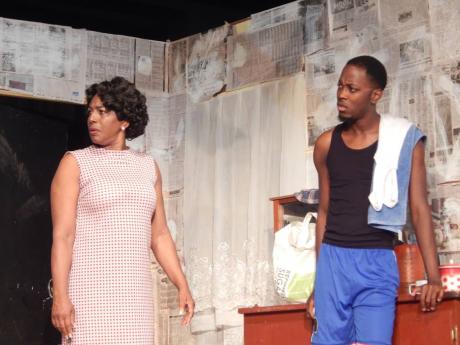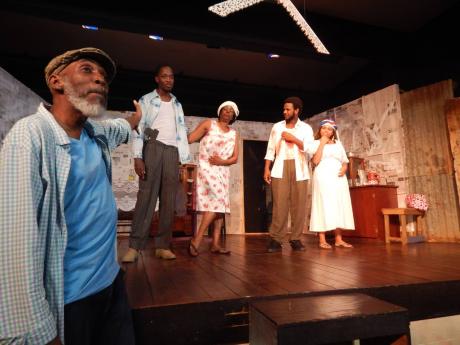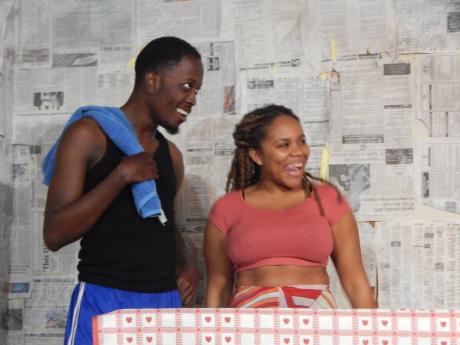‘Whiplash’ a searing Jamaican tragedy
If you want to know the causes of Jamaica’s major disease, crime and violence, go see Keith ‘Ginger’ Knight’s play Whiplash, now playing on weekends at Little Little Theatre, Tom Redcam Avenue. If all the causes are not there, the fundamental ones certainly are.
Along with poverty, politics and poor parenting, there is the get-rich-quick mentality of the two male characters on whose tragic stories the play focuses. Helpfully, Knight (1951-2023) contrasts their negative actions and attitudes to life with the more positive ones of the two female characters, suggesting that different behaviours would have led to different outcomes.
The male characters are half-brothers, Alton (played last Saturday by Jonathan McLaughlin) and Dennis (Kushnie Maxwell). They die young, leaving behind to mourn, their mother, Miss Inez (Karen Harriott), and Sweetie (Diandra Harrison), Dennis’ girlfriend and babymother.
Of the cast, only Harriott was born when Whiplash was first produced 40 years ago, and the revival by the director, E. Wayne McDonald, has proved a history lesson to the younger actors. Unfortunately, a main discovery by them has been that crime and violence have gotten worse in the four decades. On the positive side, though, Harrison correctly observed in a brief post-production discussion that more attention is now being paid by the Government to domestic abuse specifically, something her character encounters.
Considering the talent and experience behind it, the overall excellence of the show is not surprising. Knight wrote and produced more than 20 well-received plays. McDonald, founder of Caliban Productions, the producers of Whiplash, has also spent many decades in theatre, much of it in New York. His work was last seen locally in 2019 in Basil Dawkins’ Actor Boy-nominated play, Maas Matt Comes to Town.
And all who performed on Saturday were trained at the Edna Manley College’s School of Drama, with most getting additional experience. This is especially true of Harriott, a stage and television actress of 30-plus years, who got so immersed in her role that tears were still streaming down her face when the cast was taking the curtain call after Saturday’s matinee.
Her character had received bad news moments before and she became distraught. Arguably, because the play was written with Inez in the pivotal role, it’s easier for Harriott to outshine the other actors. However, they, too, are very good. That means the direction is very good.
The simple set shows an inner-city living-and-dining room with newspaper-covered walls. Significantly, it doesn’t change, even when the family moves – via criminality – from rags to riches, because Alton and Dennis have become powerful dons, carrying expensive firearms and driving even more expensive cars.
Helping to evoke the ambience of the 1970s, the period of the play, are songs and excerpts from political speeches of the time. We hear a couple of excerpts from speeches by aspiring prime minister Michael Manley, for example, and campaign songs like Betta Mus Come and My Leader Born Ya bring back memories that, paradoxically, are both painful and hopeful. Like so many Jamaican playwrights, Knight knows how to ‘tek bad sint’ing mek laugh’, and the generally emotionally searing story contains many humorous moments.
In her insightful introduction to the play, published in her book 3 Jamaican Plays: A Postcolonial Anthology (1977-1987), Honor Ford-Smith quotes Knight about his writing the play based on personal experiences during “the undeclared civil war of the 1970s”. He writes: “ When you grow up where I did with so many mothers growing their sons, this story is similar to quite a few. I combined incidents from different situations to create one story.”
The play boldly, and unusually, refers to many horrific events of the period. They include the Green Bay Massacre of 1978, in which many young men were slaughtered by agents of the State; the Orange Lane Fire (1976), in which gunmen surrounded the home of PNP supporters and set it on fire; and the Gold Street Massacre (1980), in which PNP gunmen attacked a JLP community’s fundraising dance.
This is the scenario which sees two football enthusiasts graduate to enthusiastic criminality. One feels that because of their energetic masculinity in the circumstances they were born, they were doomed from the start. We usually look at the end of a story for any hopeful message the author might have, but Knight ends this work in tears.
The production runs from Fridays to Sundays, with two shows on Saturdays and Sundays.



